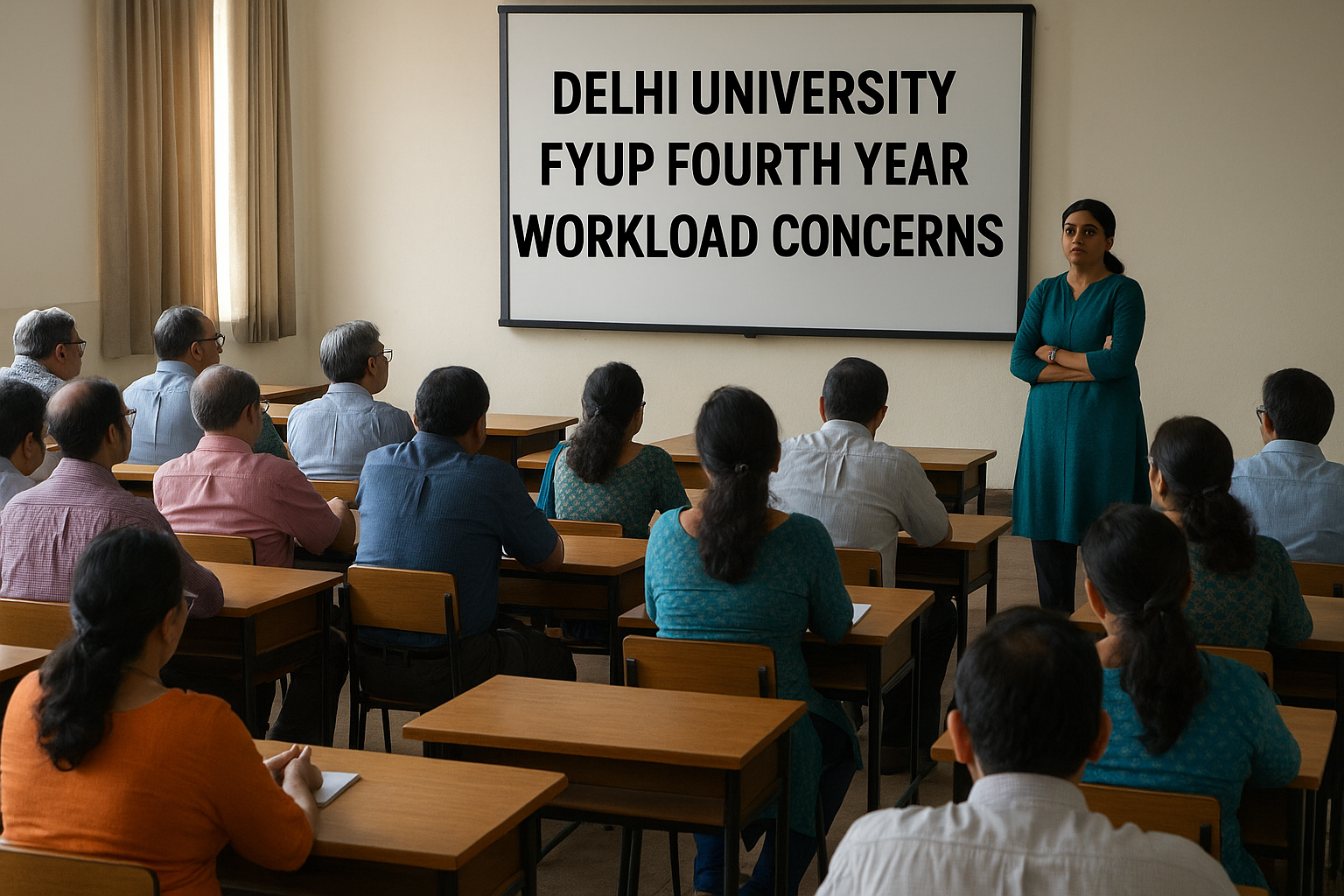Teachers Push Back Against FYUP’s Final-Year Workload
Delhi University’s implementation of the Four-Year Undergraduate Programme (FYUP), aligned with the National Education Policy 2020, has reignited academic tensions. While designed to offer students greater flexibility and interdisciplinary exposure, the fourth year of the programme is drawing increasing opposition—not from students, but from faculty members.
A growing section of Delhi University (DU) teachers has raised serious concerns about the additional workload imposed by the fourth-year curriculum, citing unsustainable academic pressure, inadequate planning, and lack of institutional support.
What Is FYUP and Why Was It Introduced?
The FYUP was reintroduced at DU in 2022-23 after being scrapped in 2014. It allows students to pursue a four-year honours degree with the option to exit after three years. Its framework is inspired by the National Education Policy (NEP) 2020, which advocates multidisciplinary education, research focus, and greater academic freedom.
The fourth year, intended as an advanced research or skill-building phase, is now mandatory for students seeking honours with research distinction. It includes dissertation work, elective modules, and in some cases, internships.
The Fourth-Year Module: A Logistical and Pedagogical Burden?
According to faculty members, the added fourth-year curriculum demands disproportionate academic involvement without adequate logistical planning.
Teachers argue that:
- They are expected to handle additional classes without corresponding reductions elsewhere.
- Evaluation duties and supervision of dissertations stretch existing faculty beyond capacity.
- Infrastructure and manpower have not expanded in proportion to curriculum requirements.
“This is not just extra work—it’s a structural overload,” said a DU faculty member from the English Department. “We’re already teaching more than the UGC-mandated load. Now we’re also expected to guide research and manage assessments for an entire additional year.”
Teachers’ Associations React: A Call for Dialogue and Reforms
The Delhi University Teachers’ Association (DUTA) has voiced strong opposition to the current structure. Their demands include:
- Hiring of additional faculty across departments.
- Reduction in mandatory workload or formal recognition of additional teaching hours.
- A review of curriculum design, especially for departments already operating at capacity.
They also point to the lack of clarity in how research supervision should be managed under undergraduate guidelines—a practice more common at postgraduate and doctoral levels.
Some faculty believe this approach risks turning research into a “tick-box exercise” rather than meaningful academic engagement.
Administrative Position: University Defends Policy Direction
Delhi University’s administration maintains that the FYUP is essential for aligning with global education standards and fulfilling NEP 2020 objectives.
A senior university official stated that mechanisms are being developed to balance workload and ensure equitable teaching assignments. However, critics argue that such planning should have preceded, not followed, implementation.
There is, as yet, no formal commitment from DU regarding faculty recruitment or a revised workload framework.
Students Weigh In: Mixed Reactions on the Fourth Year
Student responses vary widely.
Some appreciate the opportunity to pursue research early and gain academic depth, especially those planning postgraduate studies. Others feel uncertain about whether the fourth year justifies the additional cost and time, particularly in job-oriented courses.
“I like the idea of writing a thesis, but we barely have enough mentorship. One professor is handling five dissertations at once,” said a final-year Political Science student.
The quality of learning, they argue, is diluted when systems are overextended.
How Are Other Universities Managing FYUP?
The FYUP model is being adopted nationwide under NEP 2020. However, implementation varies.
Institutions like Jawaharlal Nehru University (JNU) and Banaras Hindu University (BHU) have taken more phased or department-specific approaches. Some universities are prioritizing hiring before fully rolling out fourth-year modules.
This contrast highlights that DU’s scale and centralized decision-making might be exacerbating the workload issue.
Expert Views: Balancing Vision with Realism
Educationists and policy analysts agree that while FYUP has academic merit, its success depends on execution.
- There must be systemic investment in faculty, training, and infrastructure.
- Research components at the undergraduate level require careful supervision structures and smaller class sizes.
- Faculty engagement cannot be sustained on voluntary overwork.
“Higher education reform should be evolutionary, not abrupt,” said a senior academic affiliated with the National Institute of Educational Planning and Administration (NIEPA). “Without backend support, policies may look progressive on paper but create resistance on the ground.”
Rethinking Reform Without Overload
The FYUP’s fourth year represents a step toward holistic education—but if faculty are not empowered to deliver it, the entire framework risks collapse.
Delhi University must urgently bridge the gap between policy ambition and classroom reality. Only through transparent planning, resource augmentation, and inclusive dialogue can the FYUP become a genuinely transformative experience for both teachers and students.
FAQs:
Q1. What is the FYUP at Delhi University?
The Four-Year Undergraduate Programme (FYUP) is a curriculum model introduced under the National Education Policy 2020, offering students the option of pursuing an honours degree with or without a research component in the fourth year.
Q2. Why are DU teachers opposing the fourth-year structure?
Faculty members argue that the fourth year significantly increases their workload due to added teaching hours, dissertation supervision, and evaluations without proportional staffing or support.
Q3. Is the FYUP fourth year mandatory for all DU students?
No, it is optional. However, students must complete the fourth year to earn an honours with research distinction.
Q4. What changes are teachers demanding from the administration?
Teachers want additional faculty recruitment, reduction or recognition of increased workload, and clearer guidelines for undergraduate research supervision.
Q5. How are students reacting to the FYUP fourth year?
Reactions are mixed. While some appreciate the academic depth, many express concerns about the quality of mentorship and feasibility of conducting research with overburdened faculty.
Q6. Has the DU administration responded to these concerns?
University officials maintain that the FYUP aligns with national goals and claim planning is underway to address workload, but no formal resolution has been implemented.

